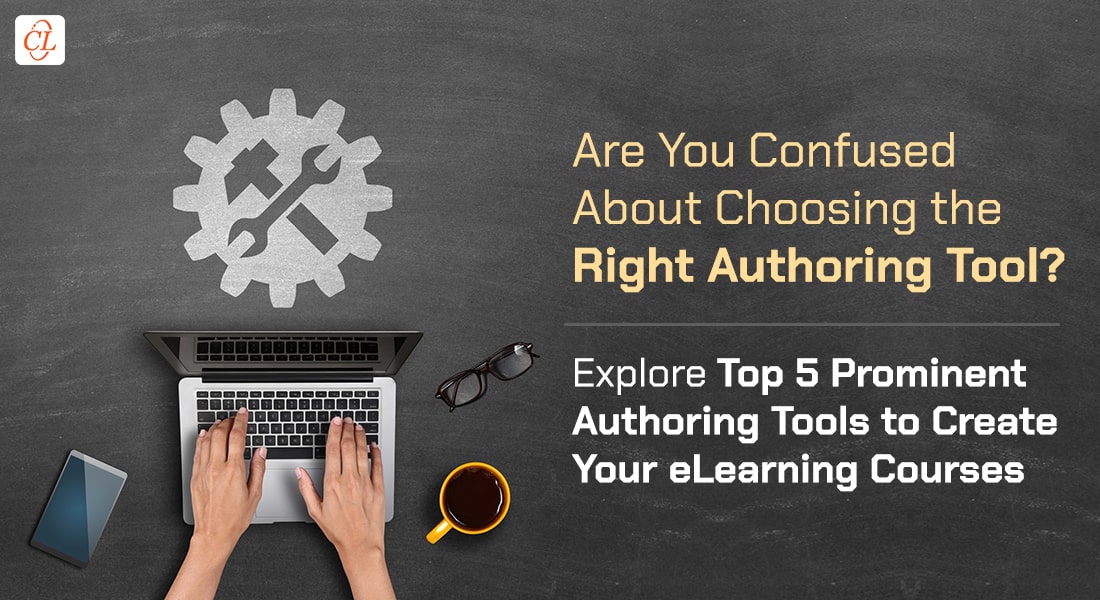A Cheat Sheet for Selecting an eLearning Outsourcing Partner

Looking to elevate your organization's Learning and Development (L&D) initiatives through strategic eLearning outsourcing? Partnering with the right eLearning company can truly take your employee training and development programs to new heights. By leveraging their expertise and their employed cutting-edge technology, you can create custom eLearning solutions that resonate with your learners’ learning needs. Ready to transform your L&D strategy? Let's explore how the right eLearning partner can make a significant impact on your organization's growth and success.
Finalizing an eLearning outsourcing vendor with whom you would like to partner, to take care of the training needs in your organization is not an easy task. It requires you to spend some time in careful analysis to understand what each vendor has to offer and how that’s going to help you deliver training that’s aligned with your business goals. So, it is crucial to get the first steps in selecting an eLearning outsourcing vendor right.
→ Download Playbook: 2025 Goal Tracker for L&D Managers [Make Winning a Habit!]
Table of Content
- Why Selecting the Right eLearning Outsourcing Partner Matters?
- How to Select the Right eLearning Outsourcing Vendor?
- What are the Considerations for Choosing the Right eLearning Outsourcing Partner?
- What are the Services that an eLearning Company Provides?
- How eLearning Outsourcing Vendors Optimize eLearning Courses?
- How to Write an Effective RFP to Get an eLearning Partner?
Why Selecting the Right eLearning Outsourcing Partner Matters?
Selecting the right eLearning outsourcing vendor is crucial for the success of any eLearning initiative. Beyond just finding a company that fits your budget, it's essential to consider several factors that directly impact the quality and effectiveness of your eLearning content. First and foremost, understanding your own needs and goals is paramount. An eLearning partner should align with your vision, whether it's creating interactive modules, developing comprehensive training programs, or integrating cutting-edge technology. Compatibility in terms of culture and communication is also vital, as seamless collaboration fosters efficiency and minimizes misunderstandings.
How to Select the Right eLearning Outsourcing Vendor — A 4-Step Guide
When it comes to choosing the right eLearning partner, it's all about finding the perfect fit for your eLearning design and development needs, right?
Here’s an infographic that lays out the steps you should follow. It covers everything from evaluating their experience to making sure they're in sync with your training goals. It's super handy for making sure you're on the right track with your decision.
Check it out—it's packed with useful steps to help you nail down the best eLearning outsourcing partner for your project!
What are the Considerations for Choosing the Right eLearning Outsourcing Partner?
Outsourcing eLearning Development? Let us Help You Choose the Right Vendor.
Here Are a Few Things to Consider:
- Experience
- Expertise
- Size and Scalability
- Client Testimonials
Read on for more!
While outsourcing eLearning development, choosing the right eLearning vendor could be a task. eLearning outsourcing is not a one-time activity! Both you and the vendor will be investing their time and effort in building trust and long-term relationships. Considering this, you need to understand your need and spend time to zero in on someone reliable, who provides the quality you are looking for and also adheres to the timeline.
Here are the factors to consider when choosing an eLearning outsourcing partner:
1. Expertise
When choosing the right eLearning outsourcing vendor, it's essential to consider their level of expertise. An ideal partner will be well-versed in the latest eLearning authoring tools, technology, and trends, with established processes for seamless execution. They should have a diverse talent pool of experts, ensuring both effectiveness and efficiency in creating custom eLearning courses. Look for eLearning companies that apply best practices in instructional design, making sure content is engaging, pedagogically sound, and aligned with organizational learning objectives. Additionally, the vendor should offer innovative eLearning solutions with varying levels of interactivities.
2. Experience
When selecting the appropriate eLearning outsourcing vendor, experience is a crucial factor to consider alongside expertise. An experienced vendor brings a depth of knowledge gained from successfully executing numerous projects across different industries. This seasoned perspective allows them to anticipate challenges, adapt quickly to unique client needs, and provide valuable insights to enhance the eLearning development process.
Moreover, an experienced vendor typically has a proven track record of delivering high-quality custom eLearning solutions that meet or exceed client expectations. Therefore, when evaluating potential eLearning outsourcing vendors, alongside expertise in tools, technology, and instructional design practices, their depth of experience in the industry should also be a key consideration to ensure a successful partnership.
3. Size and Scalability
Is the vendor prepared to be your long-term eLearning partner? Setting clear expectations about scalability from the beginning is crucial as your business expands. Depending on your training needs, discuss your requirements with the vendor. If you require rapid eLearning development, ensure they can deliver. It's essential that they stay updated on eLearning trends and possess the necessary rapid eLearning authoring tools and skills to meet your specific needs.
4. Client Testimonials
Would you buy something online without going through customer reviews? I know I won’t. Then how can we select an eLearning partner without client testimonials? The vendor may provide you with a long list of clients, however, that list cannot talk much about the quality of work. You can call the references or clients and get a much better idea about the vendor’s quality of work.
5. Transparent Pricing
Transparent pricing is crucial when selecting an eLearning company. Hidden costs can lead to unexpected financial strain and project complications. A reliable vendor will provide clear, upfront pricing that aligns with your budget and outlines all potential expenses from the outset. They should detail what is included in the pricing—such as eLearning design and development or any additional services—so you are aware of the full scope of the financial commitment. By ensuring transparency, a good vendor helps you avoid surprises and manage costs effectively, ultimately delivering better value and fostering a trustworthy partnership.

The 2025 L&D Managers’ Playbook
Make Winning a Habit!
- Take stock of your current state
- Set goals for your personal growth
- Define your professional upskilling targets
- Use the tracker, wheel of life, and other tools
- Stay on the path of success
6. Samples of Similar Projects
When evaluating potential vendors for a project, it's essential to understand their capabilities and the quality of their work. eLearning companies often have non-disclosure agreements (NDAs) that prevent them from sharing specific client projects. However, a reputable vendor should have a portfolio that highlights their skills and experience without breaching confidentiality.
To get a clearer picture of how the vendor might address your unique needs, request a prototype tailored to your requirements. This approach allows you to evaluate their problem-solving skills and creativity in a context directly relevant to your project. By reviewing this customized prototype, you can better assess whether the vendor's approach aligns with your vision and goals.
7. Project Management Process
When evaluating a vendor for your project, it's essential to assess their approach and process thoroughly whether they are agile or not. Start by understanding their project stages: how they plan, execute, and deliver their work. This includes looking at their methodologies and timelines. It's also crucial to explore their strategies for handling exceptions and unforeseen issues, as this reflects their problem-solving capabilities and adaptability.
8. Trustworthiness
Trustworthiness is critical when selecting an eLearning outsourcing vendor for a long-term partnership, as they will essentially become an extension of your organization. Start by evaluating the team's credentials, including their experience and qualifications, to ensure they possess the necessary eLearning skills and knowledge.
9. Quality Practices
It is always quality over quantity, and for learning and development, it becomes all the more important. Take time out to access the quality checks that are done by the eLearning partner throughout the process. Also, make sure to check if they have a robust checklist to maintain quality.
Where It All Comes Full Circle — Communication
As an eLearning project stakeholder, you will be required to interact with the eLearning partner regularly throughout the design and development of the eLearning course. Here’s an outline of the communication process that’s followed by best-in-class eLearning companies.
Kickstart the eLearning Project
After you choose the right, the next step is to finalize the scope of the project. Communicate your needs clearly. After all, you know what your learners need. Agree upon what can and cannot be done by the eLearning partner.
- Understand the process that will be followed for eLearning course development (e.g., Successive Approximation Model (SAM), an agile process for eLearning course development).
- Be ready with your questions if you have any for the eLearning partner. Similarly, be prepared to answer the questions they might have for you.
- The vendor would ideally draft a macro strategy for the eLearning course and design a graphical user interface (GUI) based on the training need, audience demographics, and company-specific branding guidelines (where applicable).
- If you need the course to adhere to specific guidelines in terms of language, fonts, or graphics, communicate that or share your style guide if you have one. The eLearning company can follow the style guide or design a checklist based on the project requirements. This is especially useful when working on tight schedules to complete eLearning course development.
- Review the project plan shared by the eLearning outsourcing partner. Be clear on the timelines for course review. Remember, you’ll need to block time for your subject matter experts (SMEs) to review courses, and knowing when to expect storyboards helps both you and the vendor ensure smooth development of the project.
Note: For an eLearning curriculum or a project with multiple modules, the project plan might be shared in phases.
It’s essential that you sign off on the scope, project plan, strategy, GUI, style guide/color guide, and checklist (if applicable). If there are queries at this stage, take the initiative to communicate.
Freeze the Prototype
A prototype is a scaled-down version of the eLearning course. Unlike a storyboard, the prototype is fully functional and gives you an idea of how the final course will look. Before designing the prototype, the eLearning company will finalize the learning, visual, and audio strategies. For example, if you’ve communicated that images must be sourced from your organization’s image bank, the prototype will reflect that. If you have suggestions or need changes made to the prototype, communicate them.
Remember, communication is key. Depending on what works best for you, let the eLearning partner know whether you prefer weekly calls, daily calls (depending on project requirements), or simply exchanging emails to share your thoughts.

The 2025 L&D Managers’ Playbook
Make Winning a Habit!
- Take stock of your current state
- Set goals for your personal growth
- Define your professional upskilling targets
- Use the tracker, wheel of life, and other tools
- Stay on the path of success
Move on to eLearning Development
Once the prototype is finalized, instructional designers work on the storyboards. Though the storyboard and subsequent modules go through rigorous internal quality checks, it’s always helpful to involve SMEs in the review process. Their expertise is unmatched, and their feedback ensures the course is accurate and comprehensive.
After SME feedback is incorporated, the storyboard moves to the development phase. As a stakeholder, you’ll need to review the functional course with/without audio and provide feedback. Once the course is uploaded to your centralized learning platform, it’s checked for bookmarking and completion status to ensure a smooth rollout.
Understanding with an Example:
Speaking of communication, one of our healthcare clients demonstrated an effective process. The senior training manager of the global learning team was our point of contact and worked with stakeholders and SMEs across three time zones to gather project inputs. She kept us in the loop, ensuring work continued seamlessly, even from a different time zone. That’s what we call smart communication!
Effective communication at every step and adhering to review timelines specified in the project plan are crucial for the smooth completion of an eLearning project.
What are the Services that an eLearning Company Provides?
The right eLearning outsourcing partner offers experience, expertise, and much more and ensures the successful design and development of eLearning courses that engage, educate, and empower your employees.
But how exactly can eLearning outsourcing vendors help? To answer this, we have to take you through the services that an eLearning companies offers.
Here are the services they offer:
1. Custom eLearning Content Development
eLearning vendors often specialize in creating custom eLearning course content that aligns with your organization's specific learning objectives. This can include designing interactive modules, multimedia presentations, assessments, and simulations. For instance, if a healthcare organization wants to train its staff on patient care protocols, an eLearning partner can develop engaging modules that simulate real-life scenarios, enhancing the learning experience.
Looking to outsource your eLearning content development? Here are 6 key factors you need to know to ensure success.
2. Mobile Learning Solutions
With the rise of mobile devices, eLearning companies often provide solutions that optimize training content for mobile platforms. This enables learners to access courses on their smartphones or tablets, making learning more flexible and accessible. Consider a scenario where a field sales team can complete product training modules on their mobile devices while traveling between client meetings.
3. Gamification and Interactive Elements
Engaging learners is crucial for effective corporate training, and eLearning vendors excel in incorporating gamification and interactive elements. They can design learning experiences with quizzes, challenges, leaderboards, and other game-like elements that motivate learners to actively participate.
4. Content Updates and Maintenance
Technology and information evolve rapidly, and eLearning vendors often provide services to keep your training content up to date. They can assist in regularly reviewing and updating course materials to reflect the latest industry trends and best practices. This is essential, especially in sectors like technology or healthcare, where knowledge is constantly evolving.
5. Assessment and Analytics
Effective eLearning goes beyond content delivery; it involves assessing learner progress and analyzing their performance. Many eLearning companies offer assessment tools and analytics dashboards that provide insights into learner engagement, completion rates, and areas where learners may be struggling. For instance, an eLearning partner can help a financial institution identify which modules of their compliance training are most challenging for employees.
6. eLearning Translation Services
Global organizations benefit from eLearning vendors offering eLearning translation services. These vendors can translate content into various languages, adapting it to different cultural contexts.
Here’s a quick video sharing tips on how to effectively outsource eLearning translations.
7. Technical Support and Training
Implementing eLearning solutions may require technical support and training for your organization's L&D team. eLearning companies often provide training sessions to help your team effectively manage and utilize the eLearning platform. This ensures a smooth transition and ongoing support in case of any technical issues.
You can partner with an eLearning vendor to access any of the above-listed services. Make a note that each service offered by the vendor is designed to enhance the learning experience, drive engagement, and ultimately contribute to the growth and success of the organization.
8. LMS Integration
Many eLearning vendors offer integration services to seamlessly incorporate their eLearning content into your existing Learning Management System(LMS). This integration ensures a smooth learning experience for your employees, as they can access the training material directly through the LMS. For example, a retail company can have its product knowledge courses integrated into its LMS for easy access by sales associates.
Wondering how to go about selecting an outsourcing partner for LMS services? Here’s a video to help you.
How eLearning Outsourcing Vendors Optimize eLearning Courses?
eLearning vendors specialize in creating and delivering online training programs that are optimized to meet the specific needs of the learners and the organization. Here are some ways they optimize online training programs:
Customized Content Creation
eLearning vendors customize training content to an organization's and employees’ needs and goals. They start by understanding the audience and their learning objectives. This involves understanding the employees’ job roles and responsibilities, knowledge and skill gaps, training needs, etc.
Based on this information, a unique curriculum is developed that aligns with the organization's goals and caters to the learning styles of its employees. This could include incorporating interactive elements such as videos, animations, quizzes, and games to engage learners and make the content more digestible.
Interactive Learning Tools
Interactive learning tools are crucial for successful online training. They engage learners and optimize the learning process. eLearning vendors use different techniques to ensure high levels of interactivity in online training programs.
Some of them include:
- Gamification: Adds fun and competition with elements like leaderboards, badges, and rewards.
- Simulations: Provides a risk-free environment for real-life scenarios.
- Interactive Videos: Engage learners with clickable hotspots, quizzes, and annotations.
- Virtual Classrooms: Enables live, interactive sessions with polls and group activities.
- Branching Scenarios: Develops critical thinking through decision-making.
- Social Learning: Promotes interaction through forums and communities.
- Interactive Assessments: Go beyond multiple-choice questions for practical testing.
- Microlearning: Bite-sized modules for quick, focused learning with quizzes and activities.
Personalized Learning Paths
Personalized learning is vital for effective eLearning. It tailors content, pace, and delivery to individual preferences, enhancing engagement and retention. Here's how eLearning vendors optimize it:
- Learning Needs Analysis: Understand learners' needs through surveys, interviews, or assessments.
- Customized Content: Tailor content with relevant real-life scenarios and examples.
- Diverse Learning Modalities: Offer videos, animations, simulations, quizzes, and interactive activities.
- Adaptive Learning: Use algorithms to adjust content based on learner progress.
- Self-Paced Learning: Allows learners to control their learning journey.
- Microlearning Modules: Break down complex topics into bite-sized modules for easy comprehension.
Real-time Feedback and Assessment
eLearning vendors make sure that the online training programs have real-time feedback and assessment. Unlike traditional methods that rely on post-training evaluations, eLearning provides immediate feedback which further motivates learners to perform better. eLearning vendors use tools like quizzes, simulations, and interactive exercises, customized to learning objectives and knowledge levels to make assessments fun and engaging.
Furthermore, real-time assessment lets trainers track learner progress in real-time through analytics. They can identify strengths and weaknesses, ensuring a personalized learning experience. Early detection of knowledge gaps is also possible, preventing misconceptions before learners advance.
How to Write an Effective RFP to Get an eLearning Partner?
Struggling to find the perfect eLearning partner? Follow these winning tips to craft an RFP that gets results!
Wrapping up!
Transform your eLearning initiatives with seamless collaboration and long-term partnerships with trusted eLearning outsourcing vendors. By cultivating a relationship built on reliability and innovation, you can amplify the impact of your eLearning programs. Experience streamlined processes enhanced quality, and accelerated eLearning design and development cycles that drive measurable results.
Planning to ace your L&D initiatives in 2025? Stay sharp and on track with the 2025 L&D Managers’ Playbook. This ultimate guide helps you prioritize, set clear goals, and drive your learning initiatives to success. Download it now and take your strategy to the next level!


![Steps to Select the Right eLearning Vendor [Infographic] Steps to Select the Right eLearning Vendor [Infographic]](https://blog.commlabindia.com/hs-fs/hubfs/Imported_Blog_Media/elearning-vendor-selection-steps-infographic-1.png?width=900&height=3979&name=elearning-vendor-selection-steps-infographic-1.png)






